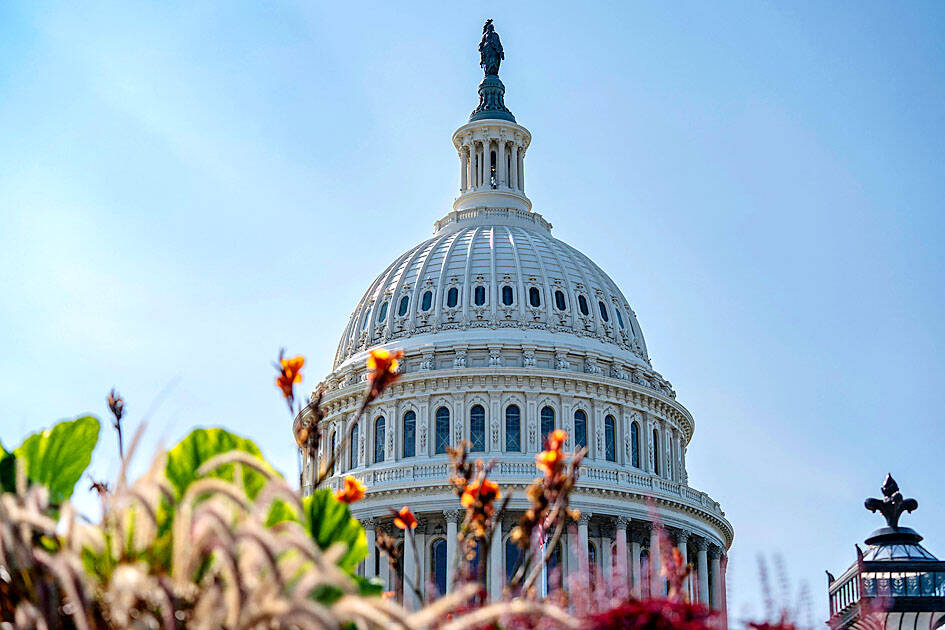The US House of Representatives on Monday passed the Taiwan Conflict Deterrence Act, aimed at deterring Chinese aggression toward Taiwan by threatening to publish information about Chinese Communist Party (CCP) officials’ “illicit” financial assets if Beijing were to attack.
The act would also “restrict financial services for certain immediate family of such officials,” the text of the legislation says.
The bill was introduced in January last year by US representatives French Hill and Brad Sherman. After remarks from several members, it passed unanimously.

Photo: AFP
“If China chooses to attack the free people of Taiwan, [the bill] requires the Treasury secretary to publish the illicit assets of Beijing’s senior-most leaders, including the names of financial institutions and maintaining accounts,” Hill said during a speech to the House.
“Let these corrupt officials explain to ordinary Chinese citizens how they acquired their riches on a government salary,” Hill added, after suggesting that Beijing “has failed to deliver a social safety net and families are battered by sinking real-estate debt.”
“This bill goes beyond naming and shaming” as it would also “cut off access” to the US financial system for CCP officials and their “immediate family,” he said. “For Chinese officials whose families profit from their ill-gotten gains, they too will find the world becoming a much smaller place.”
The Arkansas representative said that the US’ formal diplomatic recognition of Beijing in 1979 was based on the premise that “the future of Taiwan would be determined by peaceful means.”
Any actions, including a blockade of Taiwan, would “threaten regional peace and security,” Hill said.
Sherman said that the bill “is designed to put the government of China on notice that the United States is closely watching its increasing threats toward Taiwan.”
“This bill does not focus on retaliating against the Chinese government per se, but rather on individuals who are in that government,” he said.
Sherman, who represents California’s 32nd district, said the measures stipulated in the act would only be triggered if the US president exercised their authority under Section 3 of the Taiwan Relations Act.
“I don’t expect that a triggering will ever occur, but it’s important to put Beijing on notice of what would happen if their threats against Taiwan raised to that level,” Sherman said.
In Taipei yesterday, Minister of Foreign Affairs Lin Chia-lung (林佳龍) expressed gratitude to the US Congress for using a “creative and effective way” to deter Chinese military aggression toward Taiwan.
“This kind of legislation allows us to jointly deter Chinese communist expansion and to uphold peace in the Indo-Pacific region, especially cross-strait stability and security,” Lin said.

A magnitude 5.6 earthquake struck off the coast of Yilan County at 12:37pm today, with clear shaking felt across much of northern Taiwan. There were no immediate reports of damage. The epicenter of the quake was 16.9km east-southeast of Yilan County Hall offshore at a depth of 66.8km, Central Weather Administration (CWA) data showed. The maximum intensity registered at a 4 in Yilan County’s Nanao Township (南澳) on Taiwan’s seven-tier scale. Other parts of Yilan, as well as certain areas of Hualien County, Taipei, New Taipei City, Taoyuan, Hsinchu County, Taichung and Miaoli County, recorded intensities of 3. Residents of Yilan County and Taipei received

Taiwan has secured another breakthrough in fruit exports, with jujubes, dragon fruit and lychees approved for shipment to the EU, the Ministry of Agriculture said yesterday. The Animal and Plant Health Inspection Agency on Thursday received formal notification of the approval from the EU, the ministry said, adding that the decision was expected to expand Taiwanese fruit producers’ access to high-end European markets. Taiwan exported 126 tonnes of lychees last year, valued at US$1.48 million, with Japan accounting for 102 tonnes. Other export destinations included New Zealand, Hong Kong, the US and Australia, ministry data showed. Jujube exports totaled 103 tonnes, valued at

TRUST: The KMT said it respected the US’ timing and considerations, and hoped it would continue to honor its commitments to helping Taiwan bolster its defenses and deterrence US President Donald Trump is delaying a multibillion-dollar arms sale to Taiwan to ensure his visit to Beijing is successful, a New York Times report said. The weapons sales package has stalled in the US Department of State, the report said, citing US officials it did not identify. The White House has told agencies not to push forward ahead of Trump’s meeting with Chinese President Xi Jinping (習近平), it said. The two last month held a phone call to discuss trade and geopolitical flashpoints ahead of the summit. Xi raised the Taiwan issue and urged the US to handle arms sales to

BIG SPENDERS: Foreign investors bought the most Taiwan equities since 2005, signaling confidence that an AI boom would continue to benefit chipmakers Taiwan Semiconductor Manufacturing Co’s (TSMC, 台積電) market capitalization swelled to US$2 trillion for the first time following a 4.25 percent rally in its American depositary receipts (ADR) overnight, putting the world’s biggest contract chipmaker sixth on the list of the world’s biggest companies by market capitalization, just behind Amazon.com Inc. The site CompaniesMarketcap.com ranked TSMC ahead of Saudi Aramco and Meta Platforms Inc. The Taiwanese company’s ADRs on Tuesday surged to US$385.75 on the New York Stock Exchange, as strong demand for artificial intelligence (AI) applications led to chip supply constraints and boost revenue growth to record-breaking levels. Each TSMC ADR represents